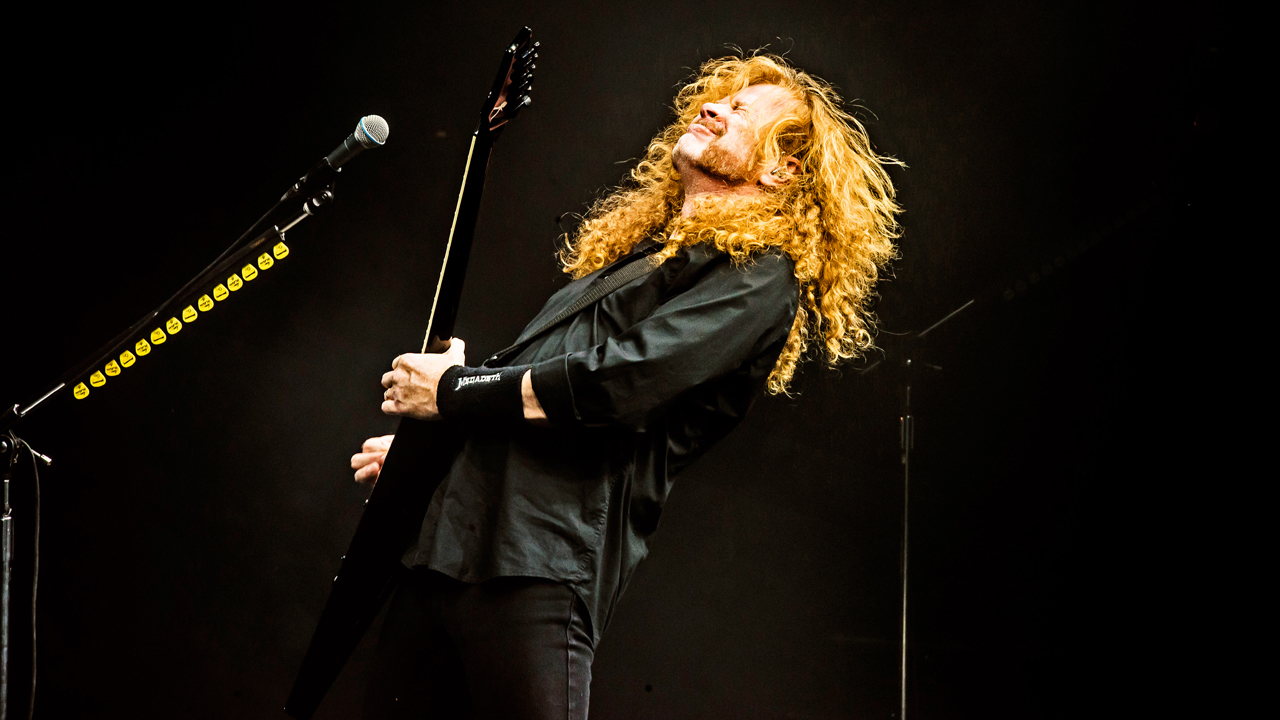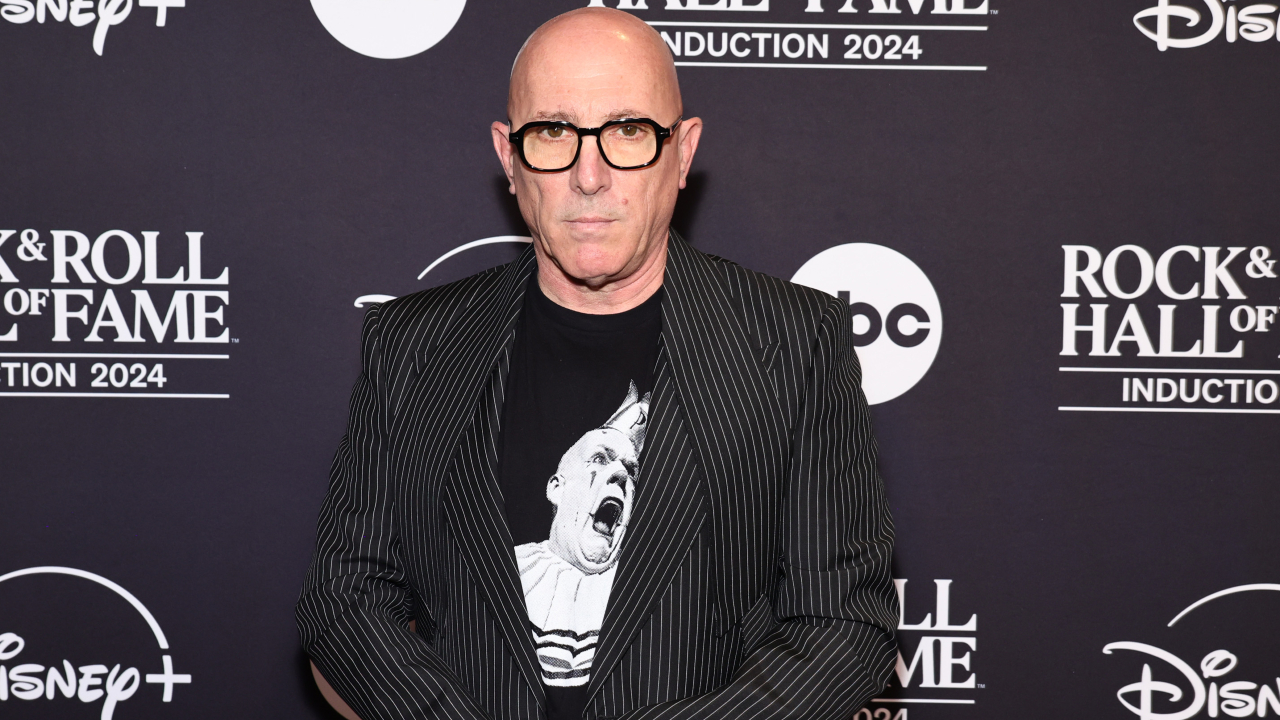You can trust Louder
Lit from behind with a powerful spotlight, Dave Mustaine is totally rocking that big-haired Bonnie Tyler look as he yanks another skin-flaying speed-punk solo from his guitar. The super-sized screen behind him belches lurid visions of blazing street riots, nuclear explosions, alien autopsies, terrorist atrocities, robot death squads and 50 shades of alt.right conspiracy theory. The fun just never ends. After more than 30 years of surges and slumps, feuds and fall-outs, Megadeth find themselves uncannily in tune with the zeitgeist in 2017.
Headlining Bloodstock Open Air festival, Megadeth are unloading their full, multi-megaton payload on to a leafy corner of rural Derbyshire – with agreeably cataclysmic consequences. While some of the band’s more recent tours have felt perfunctory, they appear to be back on meaty and muscular form here. The rhythm guitar has real crunch and punch, the booming twin bass drums sound cavernously huge, the visuals are gloriously gaudy without swamping the songs.
Fresh blood has clearly been a factor in Megadeth’s current rude health. After multiple personnel changes, these all-American thrash pioneers are more of an international coalition nowadays. Last year Mustaine and long-standing bass guitarist David Ellefson were joined by Brazilian guitar virtuoso Kiko Loureiro and Belgian drummer Dirk Verberuren. Both feel like vital forces at Bloodstock, shredding and pounding the guts out of Hangar 18 and Wake Up Dead. Some long-time fans even claim this is the band’s best line-up since their fabled Nick Menza/Marty Freidman era. Which is arguable, but this much is certain: Megadeth have got their mojo back.
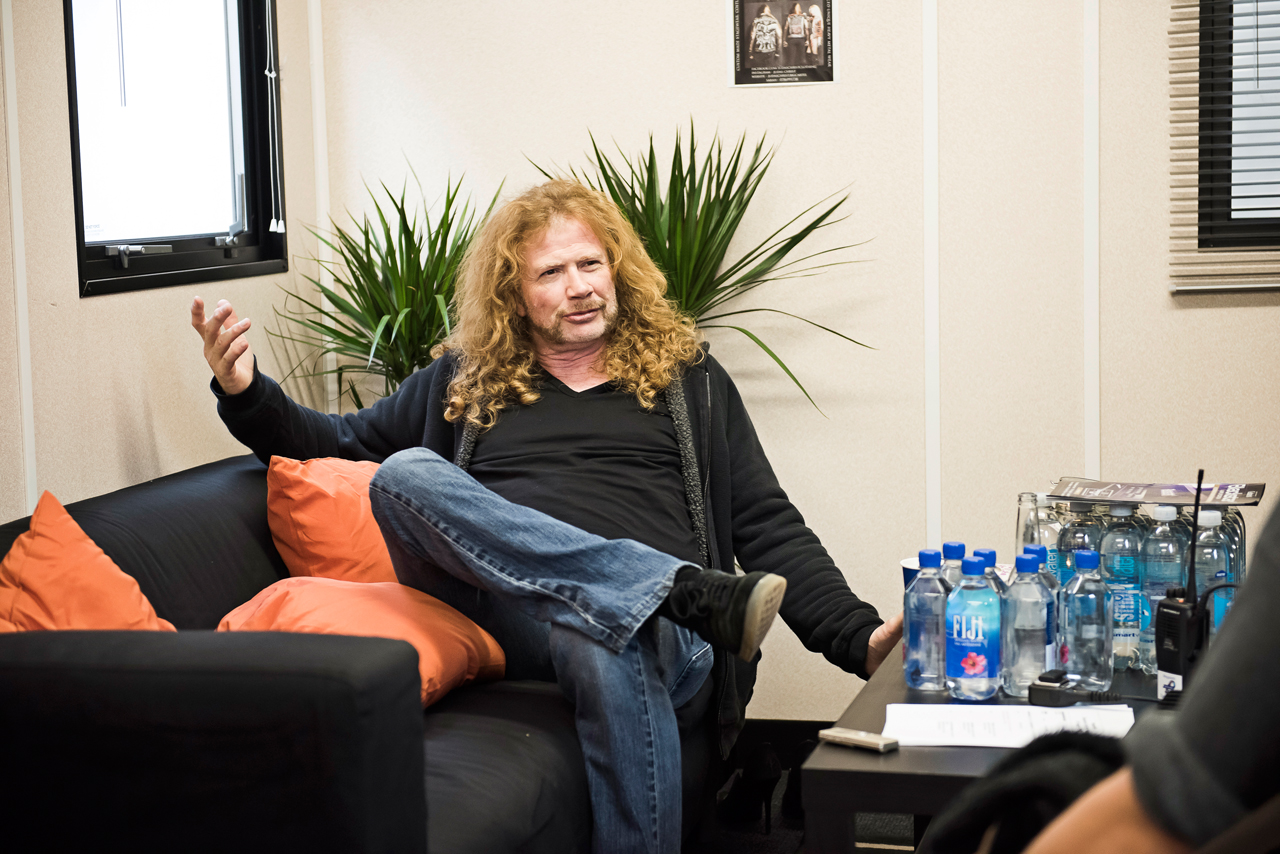
Two hours earlier, backstage at Bloodstock, the Megadeth compound hums with a businesslike calm. Fenced off from the rest of the VIP zone, the band’s circle of cabins includes a separate practice room, management office and, in the dressing room, a rack of four luxuriant dressing gowns in tasteful dark grey. Such are the small but significant status signifiers of a multi-platinum festival headliner.
Dave Mustaine is in a buoyant mood. This is partly, he explains, because Megadeth now have much more harmonious management and band members than they did two years ago. Indeed his loathing for ex-managers and their Machiavellian misdeeds becomes something of a recurring motif in our chat. But Mustaine’s temperament is generally cheery as Megadeth bask in a sustained critical and commercial resurgence. “It’s been longer than I thought it would be and better than I imagined,” he says. “My mind’s blown, honestly.”
Released in early 2016, Megadeth’s fifteenth studio album, Dystopia, received some of their best reviews and highest chart positions in more than 20 years, peaking at No.3 in the US Billboard chart and No.11 in the UK.
“It’s important”, Mustaine says, grinning. “People who say charts aren’t important don’t ever get high up in the charts, ha! If they were up in the Top 10 it would be fucking important. So having been up there for most of my career, it’s important.”
Sign up below to get the latest from Classic Rock, plus exclusive special offers, direct to your inbox!
In January this year, Dystopia’s title track earned Megadeth their first ever Grammy after a dozen unsuccessful nominations. Never overly troubled by modesty, Mustaine feels the accolade was long overdue. “That’s such a bummer, when people used to come up and say: ‘Hey, man, tough luck about the Grammy.’ Well tough luck about you, motherfucker! Did you get nominated?”
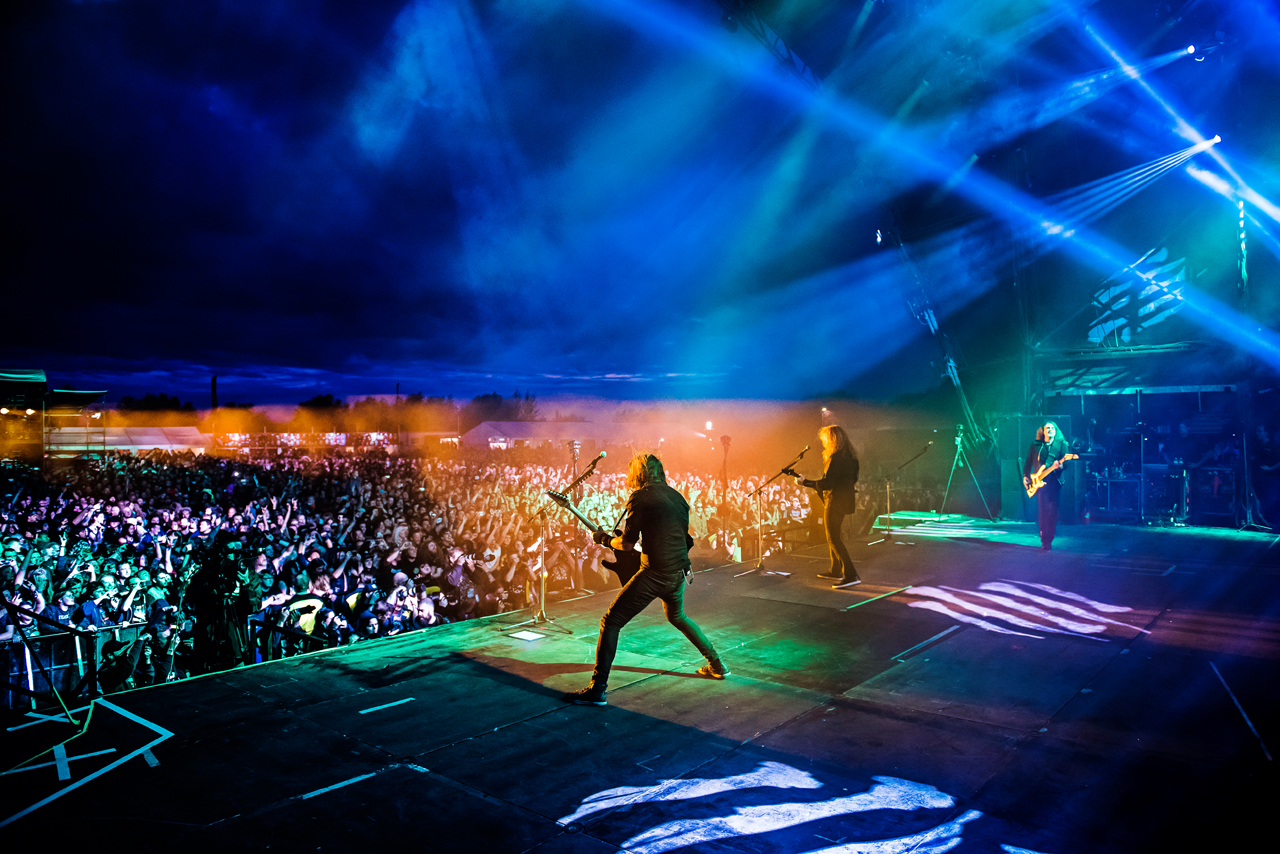
Mustaine is half-joking here, playing up to his prickly public persona. He may have a reputation for being combative in interviews and making contentious statements, but at Bloodstock he seems genial and relaxed. “I know people don’t like me, I also know a lot of people do,” he shrugs. “And the ones who don’t like me, I’m not going to say: ‘Fuck you’, I’m just going to say: ‘Fuck you for now.’ Ha!”
Mustaine has admitted he was an “arrogant asshole” in his youth, but perhaps he is mellowing at the ripe old age 55?
“I don’t know if ‘mellowing’ is the word,” he says, “it’s more being able to take perspective of what’s going on,” he muses. “Me and David Ellefson, it was us against the world. A lot of times I look back at the behaviour I had to do, and if it wasn’t survival mechanisms and I didn’t have to fight for myself, I imagine at least fifty per cent of that behaviour would never have occurred. But if you put a snake in your backyard you can’t expect it to only bite your neighbours.”
With its feverish visions of political strife and impending civil war, Dystopia sounds like an album that was tailor-made for the Trump era. But of course the album was written and recorded long before last year’s elections. In fairness, Mustaine has written apocalyptic albums under other presidents, and he was careful to avoid publicly endorsing any candidate. But he does concede that Megadeth seem to enjoy greater success during turbulent, divided times.
“I think the music has a way of being popular during periods of chaos and confusion” he nods. “Because people kind of go to it with the safety of knowing there’s a lock on the door. There are certain things people want to hear in the background, they just want to feel comfortable.”
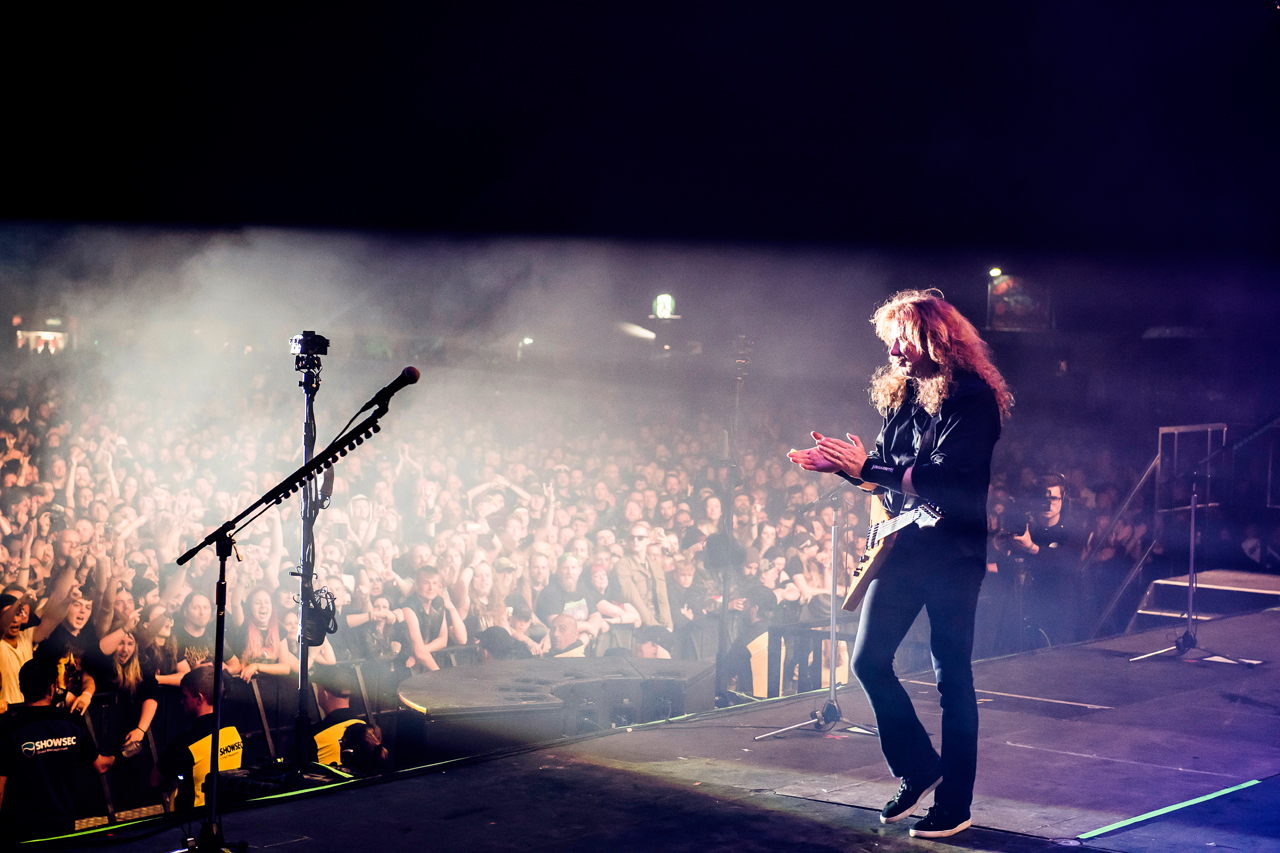
Megadeth have a strong religious hinterland which sits a little oddly with the profanity and nihilism of thrash metal. Ellefson is a pastor in Arizona, while Mustaine’s born-again Christian faith has led him to make problematic statements over the years. He no longer plays certain songs that flirt with satanic imagery, but he denies that religion has had a strong effect on his general outlook.
“Not to the extent people make it out to be,” he insists. “There are certain things I believe in that are part of my faith and I’d rather not get into it because that’s what the faith is, and people who have a problem with that can take it up with God. As far as me telling you that you are wrong, I don’t do that, I would never do that. But if there is something said in the songs, like for example the Sex Pistols song we used to do, the first line says: ‘I am an Antichrist…’ I am not an Antichrist, I never have been. I didn’t even know what it was, I just thought it was a kind of a cool word, you know?”
Nowadays, at least Mustaine has God on his side. Shortly before before taking the stage as Bloodstock, as they do at every show, Megadeth form a circle and say a simple group prayer to shelter them from evil. Partly in response to horrific events like the shooting of Dimebag Darrell and the Bataclan massacre in Paris, Mustaine describes this group hug as more lucky charm than religious rite.
“It’s not a ritual, it’s a routine,” he insists. “We’re not doing this as a religious thing, we are doing it more for a request for us to all be protected, you included. Whether people want that or not.”
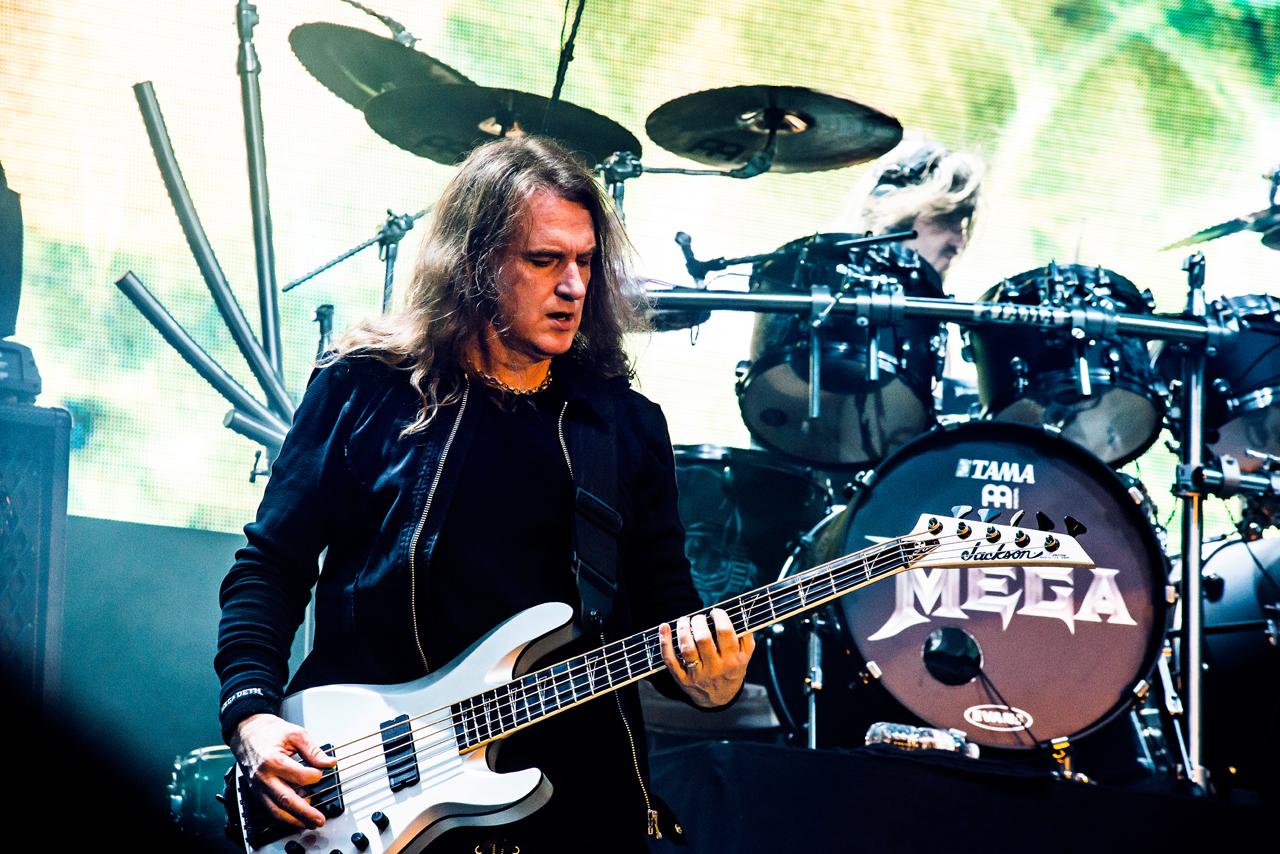
Fast-forward to the show, and Mustaine is headbanging like a man possessed. While never a particularly dynamic frontman, he does appear more mobile at Bloodstock than in recent years, prowling the full width of the stage and striking messianic poses in the blinding spotlights. During the snarly Dystopia song The Threat Is Real, he stands in formation with Ellefson and Loureiro for some vigorous synchronised moshing. For a man who suffered a neck injury five years ago which almost ended his career, there is something admirable about this demented display.
“In 2012 I fused my neck together, couldn’t play for seventeen months,” Mustaine told me before the show. “Doctors said I would never play guitar again. So I said fuck you, got on the plane in Texas, flew back to Arizona where I lived, and saw a different doctor. The work was hard, but I got it back, because I was determined. Nobody’s going to tell me I’m not going to do something. Am I a hundred per cent back? I think so.”
To be frank, at 55, Mustaine’s voice is no longer quite the powerhouse guttural demon-growl it once was, increasingly taking on more of the coarse-grained rasp of a gnarly old bluesman. This is not exactly a serious blemish on the music, but it does lend a striking new tone to Megadeth classics like Sweating Bullets, whose strolling jazzy rhythm and sandpaper vocal are tonight closer to Tom Waits than to James Hetfield. With its hard-rock energy diminished, the song’s sheer oddness stands out, a stray cat strut with a spring-heeled bounce.
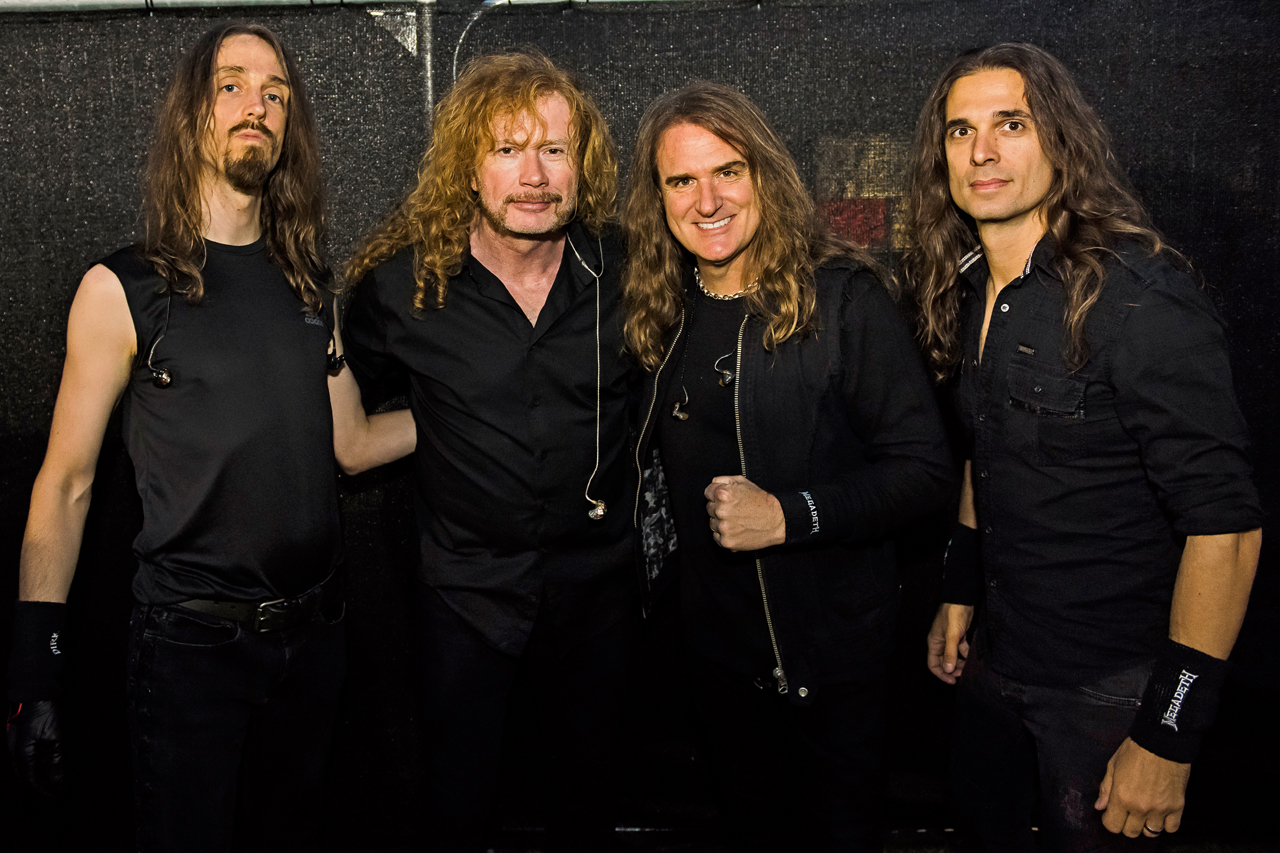
The twin highlights of the new album material at Bloodstock are probably the least thrash-centric tracks Megadeth have yet recorded. Both were co-written by Loureiro, and both are fine showcases for his skills. The instrumental Conquer Or Die! is a sensual mood piece couched in luscious classical finger-picking on a nylon-stringed acoustic guitar, while Poisonous Shadows is a florid epic of cinematic proportions, all towering choral fanfares and exotic tonal shifts; Megadeth finally have their Kashmir.
If Megadeth feel musically refreshed, Loureiro and Verbeuren are clearly vital to the band’s new formula. “They’re good guys, better players,” Mustaine tells me. “Without taking anything away from the players in the past – and I’ve had so many great players in the past, I wouldn’t have picked them if they weren’t. But these guys are so true to what I think is the legacy of the music.”
Midway through their Bloodstock set, Megadeth drift into chugging autopilot a little with Trust and A Tout Le Monde, 90s riff-grinders which once had a hard-edged, pop-thrash bite but which now come across as a little anodyne. Melodic and mainstream were never Mustaine’s best looks.
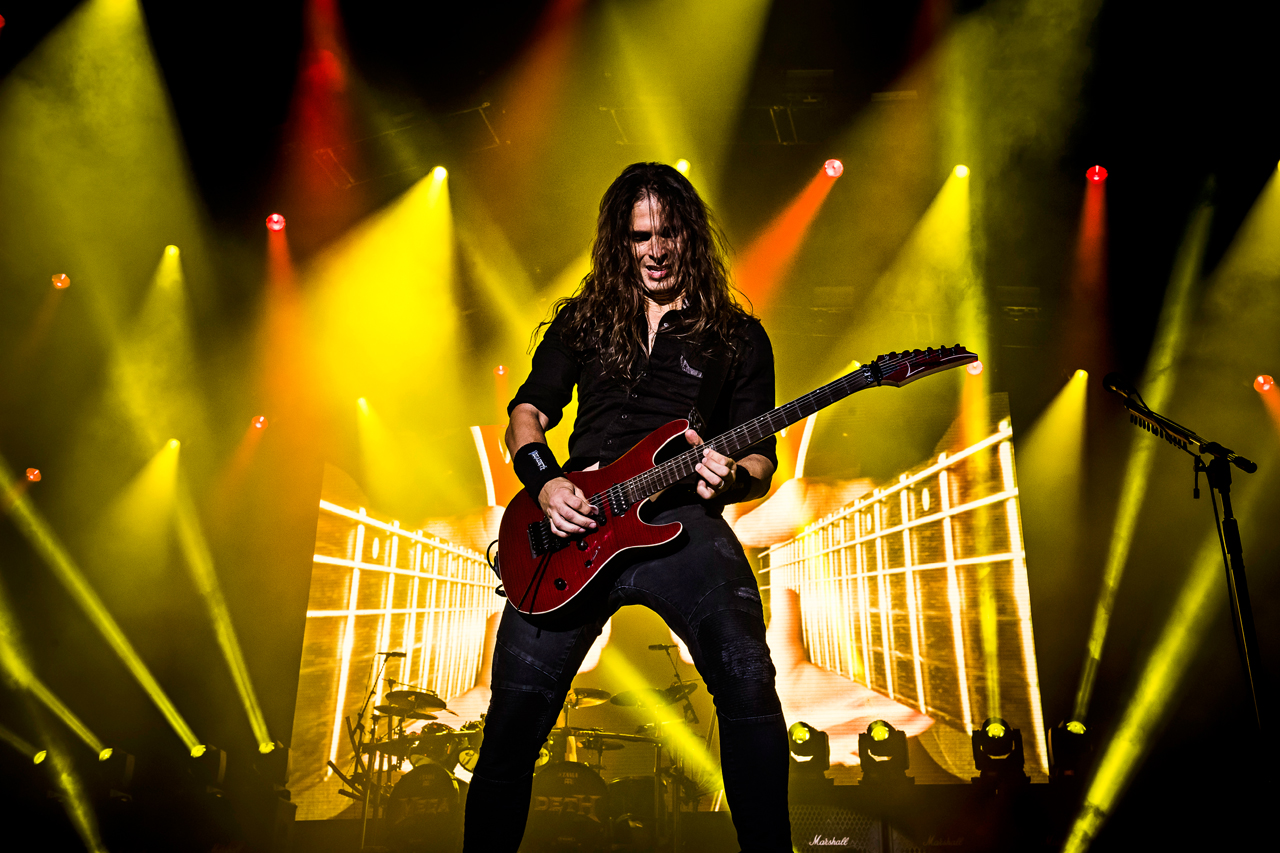
lammer that dates back to Mustaine’s traumatic apprenticeship with Metallica, and the anthemic bombast of Dystopia itself. The accompanying animated video features the band’s skull-faced icon Vic Rattlebag in a Terminator-like battle between humans and machines. In both sound and look, it locates Megadeth firmly in Iron Maiden territory, a connection that may not be wholly accidental. Megadeth and Maiden have a friendship stretching back decades, and have even discussed plans for a major world tour together.
“I just saw Steve Harris down in Spain,” Mustaine tells me before the show. “People don’t know this, but Steve and I spoke the night that I lost my job in Metallica. When we were in New Jersey, he came to watch us play with Vandenberg and The Rods because he had heard about us and wanted to see what it was all about. It was so neat to see him there. It reminds me of times when I’m a fly on the wall in clubs.”
Megadeth round off Bloodstock with Symphony Of Destruction, a vintage crowd pleaser which sounds as head-explodingly pugnacious as ever. The screen blazes with dramatic footage of crooked politicians, violent street riots, stars-and-striped flags in flames. Both song and video are 25 years old, but both could have been released last week. This the way the world ends, not with a bang but with a sustained barrage of eyebrow-scorching guitar solos.
Mustaine has attracted mockery and derision over the decades, some of it deserved, but the lion’s share of this show is charged with the kind of visceral, elemental, primal energy that never dates. Punk-metal intensity on a stadium scale. Love them or loathe them, Megadeth still make a gloriously apocalyptic racket.
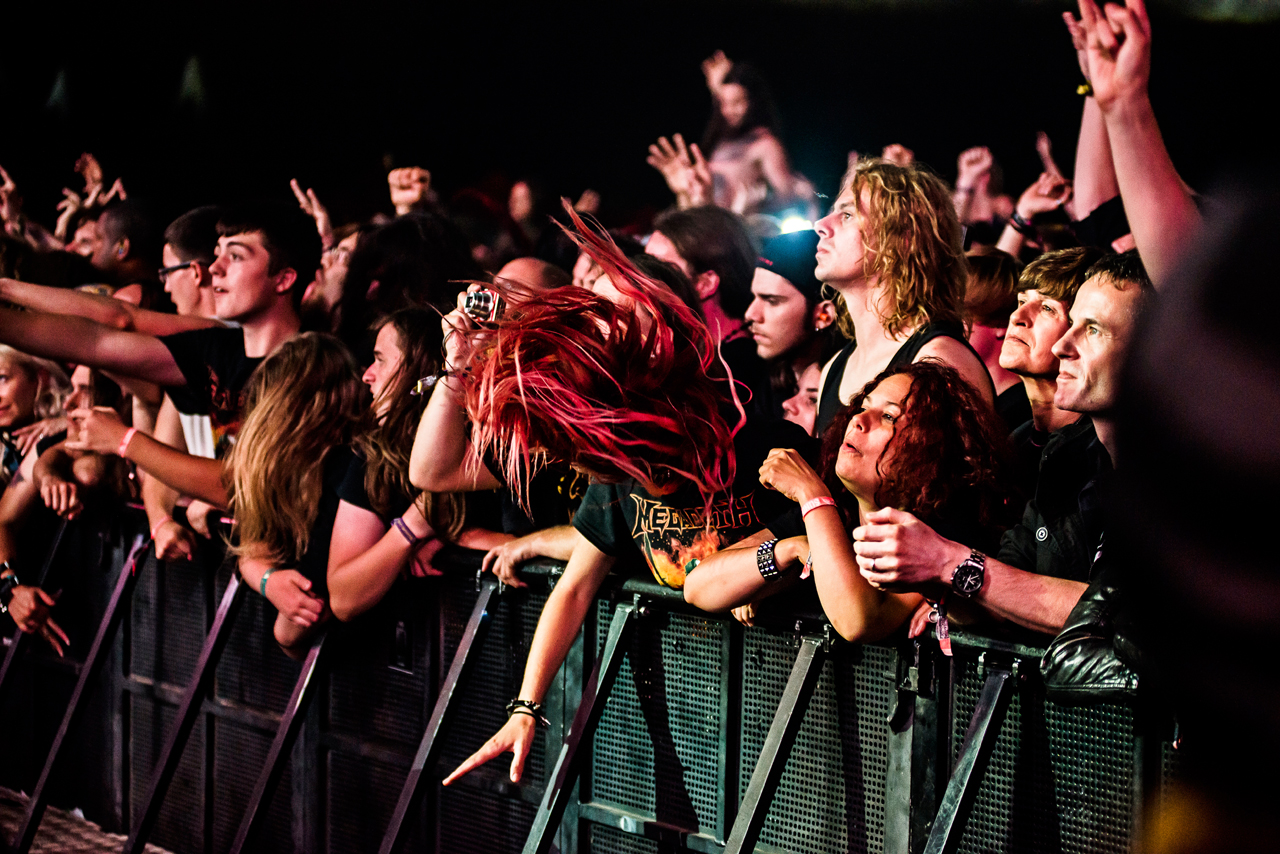
Megadeth’s Dave Mustaine: The 10 Albums That Changed My Life
Megadeth’s Dave Mustaine condemns Charlottesville violence
Thinking Out Loud: Dave Mustaine on drugs, politics and religion
Stephen Dalton has been writing about all things rock for more than 30 years, starting in the late Eighties at the New Musical Express (RIP) when it was still an annoyingly pompous analogue weekly paper printed on dead trees and sold in actual physical shops. For the last decade or so he has been a regular contributor to Classic Rock magazine. He has also written about music and film for Uncut, Vox, Prog, The Quietus, Electronic Sound, Rolling Stone, The Times, The London Evening Standard, Wallpaper, The Film Verdict, Sight and Sound, The Hollywood Reporter and others, including some even more disreputable publications.
